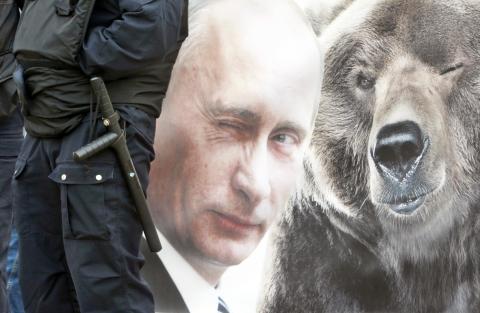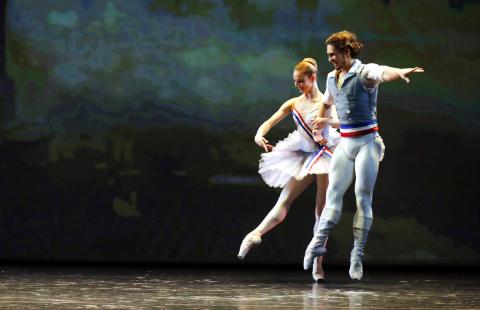After the media, the oligarchs and the opposition, Vladimir Putin’s Russia is turning up the heat on the arts, with a “blasphemous” opera, a raunchy teen dance show and an “insulting” Hollywood film all taking fire.
Claiming a mission to protect the sensibilities of the Russian people, the Kremlin and the Orthodox Church are leaning on artists to imbue their creations with greater morality.
The attacks go over well in a society steeped in the conservative anti-Western values preached by Putin, who has been isolated by the West over the Ukraine crisis.

Photo: AP
Since the Russian strongman burst onto the center stage in 1999, several groups have been called to heel, from journalists to business magnates and human rights activists.Now the authorities’ sights are trained on the cultural sector, with the government keen to promote a new approach.
“The time has come to formulate our own vision of ourselves as heirs to Russia’s great, unique civilization,” Culture Minister Vladimir Medinsky said, explaining the recent banning of the release of the Hollywood thriller Child 44, about a serial killer operating in Joseph Stalin’s Russia.
The minister accused the film, which stars Vincent Cassel and Gary Oldman, of the “distortion of historical facts” and depicting Soviet Army officers as “blood-thirsty ghouls”.

Photo: EPA
A few weeks before that, the object of popular wrath was the head of the state-funded Novosibirsk State Opera and Ballet Theater.
Boris Mezdrich was fired for sensationally depicting Jesus Christ as a character in an erotic movie in his production of Richard Wagner’s opera Tannhaeuser, triggering an outcry from spectators and the church.
Other productions or works to cause a furore this year included a mural by a street artist in the eastern city of Perm showing the first man in space, Russia’s Yuri Gagarin, as a “Jesus of science,” being crucified.
The artist faces up to one year in prison. An exhibition by Canadian artist Frank Rodick of pictures of his dead mother also caused scandal, with church authorities in the Baltic Sea exclave of Kaliningrad calling for “limits on what is tolerable in art”.
In another vein entirely, three teens filmed twerking in front of a World War II memorial were sentenced to up to 15 days imprisonment.The sentencing came after a video of girls in leotards twerking at a dance school in the southwestern city of Orenburg went viral, prompting the Investigative Committee to launch an indecency probe.
‘WE MUST PROTECT OURSELVES’
Artists whose work is deemed “blasphemous” also face having the book thrown at them.
In July 2013, lawmakers adopted legislation making it a crime to insult believers’ feelings, punishable by up to three years in prison. From a dozen cases in 2013 the number of prosecutions under the law rose to around 50 last year.
For film director Sergei Selyanov, producer of animated films inspired by Russian folklore, the “censorship aims to fill the void left by the (loss of an) historic national identity, which was buried together with the USSR”.
The current concept of Russian nationhood, said Konstantin Remchukov, chief editor of the Nezavisimaya Gazeta daily, is based on “two obligatory elements, patriotism and anti-Westernism.” Hostility to the West has flourished among both the elite and ordinary Russians, who have been fed a staple diet of anti-Western fare by the media over the Ukraine crisis and the legalization of gay marriage in several countries.
A troupe of actors from the western city of Pskov recently came out swinging — against a play in which they themselves were cast.
One of the actors, Sergei Popkov, took issue with the character of a dwarf who becomes king, seeing in it an “allusion to our president.”
“We must protect ourselves...against the West which wants to destroy everything here,” he said, demanding a return to Soviet-style cultural censorship.
World War II, or the Great Patriotic War as Russians call it, is a prime example of a sacrosanct subject, where self-censorship is exercised. Bookshops in Moscow recently pulled their copies of Art Spiegelman’s Pulitzer prize-winning graphic novel about a Holocaust survivor, Maus, because it features a swastika on the cover.
With parliament having adopted a law in December banning Nazi propaganda the stores decided to play safe rather than risk prosecution.

Google unveiled an artificial intelligence tool Wednesday that its scientists said would help unravel the mysteries of the human genome — and could one day lead to new treatments for diseases. The deep learning model AlphaGenome was hailed by outside researchers as a “breakthrough” that would let scientists study and even simulate the roots of difficult-to-treat genetic diseases. While the first complete map of the human genome in 2003 “gave us the book of life, reading it remained a challenge,” Pushmeet Kohli, vice president of research at Google DeepMind, told journalists. “We have the text,” he said, which is a sequence of

On a harsh winter afternoon last month, 2,000 protesters marched and chanted slogans such as “CCP out” and “Korea for Koreans” in Seoul’s popular Gangnam District. Participants — mostly students — wore caps printed with the Chinese characters for “exterminate communism” (滅共) and held banners reading “Heaven will destroy the Chinese Communist Party” (天滅中共). During the march, Park Jun-young, the leader of the protest organizer “Free University,” a conservative youth movement, who was on a hunger strike, collapsed after delivering a speech in sub-zero temperatures and was later hospitalized. Several protesters shaved their heads at the end of the demonstration. A

Every now and then, even hardcore hikers like to sleep in, leave the heavy gear at home and just enjoy a relaxed half-day stroll in the mountains: no cold, no steep uphills, no pressure to walk a certain distance in a day. In the winter, the mild climate and lower elevations of the forests in Taiwan’s far south offer a number of easy escapes like this. A prime example is the river above Mudan Reservoir (牡丹水庫): with shallow water, gentle current, abundant wildlife and a complete lack of tourists, this walk is accessible to nearly everyone but still feels quite remote.

In August of 1949 American journalist Darrell Berrigan toured occupied Formosa and on Aug. 13 published “Should We Grab Formosa?” in the Saturday Evening Post. Berrigan, cataloguing the numerous horrors of corruption and looting the occupying Republic of China (ROC) was inflicting on the locals, advocated outright annexation of Taiwan by the US. He contended the islanders would welcome that. Berrigan also observed that the islanders were planning another revolt, and wrote of their “island nationalism.” The US position on Taiwan was well known there, and islanders, he said, had told him of US official statements that Taiwan had not